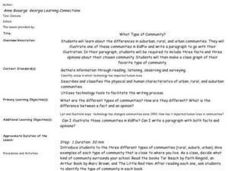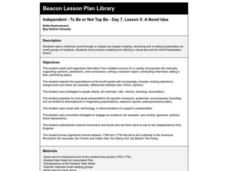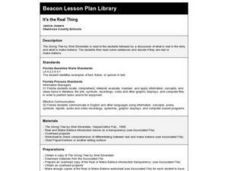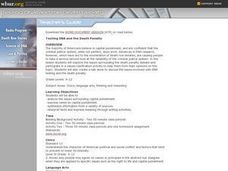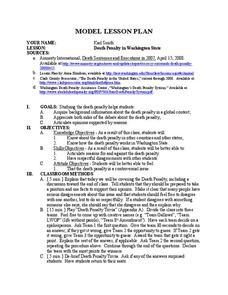Curated OER
Writing a Letter to the Editor
Students identify the main elements/structure of a letter to the editor. They brainstorm for thoughts and opinions on a specific topic and write a first draft of a letter to an editor of a newspaper. They give each other preliminary...
Curated OER
Objective Versus Subjective
Young scholars examine the difference between subjective and objective statements, newscasts, and media. They discover that subjective is opinion based and objective is fact based.
Curated OER
What Type of Community?
Students compare and contrast suburban, rural and urban communities. They read books such as The Little Red Hen and identify the type of community in each book. Using computer software, they write about each type of community and...
Curated OER
Find the Question
Students look at a group of statements, and pick out the one statement that is actually a question. For this question lesson plan, students eliminate statements as they read.
Nazareth College
Create Your Own Tornado
Third graders identify key concepts and definitions about tornados. They work in small groups of three to four to create mini-tornados. After reading Tornado Alert as a class, 3rd graders discuss tornados and fill out a KWL chart.
Curated OER
The Vaccination Question
Young scholars share opinions about common vaccines, then consider facts and opinions about the HPV vaccine and hold a fishbowl and discussion. They survey members of the community to determine their perspectives on the issue.
Curated OER
Structure and Support
Eighth graders read copies of The Declaration of Independence, United States constitution, and the Bill of Rights. They write an opinion about the document they feel is most important in the history of the united states. This is their...
Curated OER
Speak Out!
Students consider their opinions on various topics and issues related to the terrorist attacks on the United States on September 11, 2001. Then, focusing on one specific topic, each student supports his or her opinions in a...
Curated OER
Genetics
High schoolers investigate public policy regarding genetic research and have formed an educated opinion on what they believe the government role should be.
Curated OER
Cause and Effect
Students identify cause and effect relationships in a short story. After reading a short story, they participate in a discussion of how one event in a story can lead to several others. Students are then paired for a matching task that...
Curated OER
History Repeats Itself
Pupils read about an event that occurred 140 years ago to ascertain
information (who? what? when? where? why?) and to compare this event to Rosa Parks arrest almost 50 years ago. They retell the story from your point of view.
Curated OER
Up, Up, and Away
Middle schoolers research hot-ballooning using Internet resources including an around-the-world balloon flight. They determine fact from opinion, examine point of view, and determine main idea, and details. They write a journal entry...
Curated OER
Juvenile Delinquency
Ninth graders analyze and interpret historical research by examining, analyzing, and forming opinions regarding primary resources. They compare/contrast social conflict, its causes and effects, in regards to continuity and change over time.
Curated OER
A Novel Idea
Fifth graders read a historical novel. In groups they reenact chapters of the novel.
Curated OER
It's the Real Thing
Students listen to a read-aloud of Shel Silverstein's, The Giving Tree, identifying which parts of the story and which are make believe.
Curated OER
Debating for Land
Students research pertinent information based on historical facts and is supported by quotations from primary sources in order to prepare for a class debate about land ownership in the 19th century.
Curated OER
A Race to Watch: Campaign 2008, The Role of Technology and the Internet
Students listen to a statement about the role the Internet plays in the political process and respond by placing a card under the appropriate agree/disagree sign at the front of the room. Students brainstorm reasons to select their...
Curated OER
Block the Shock Jock or Not?
Pupils examine their own experiences with racist and sexist speech by deciding whether or not they agree or disagree with statements related to this subject. They explore the limits of public speech by reading about the controversy...
Curated OER
Identifying Propaganda Techniques
For this propaganda techniques worksheet, students write the technique next to the sentence read by a candidate. Students complete 12 problems.
Curated OER
Testing DNA and the Death Penalty
Students explore issues surrounding death penalty debate and participate in a values-clarification activity to help them form their opinions on this topic. They create a talk show to discuss issues involved with DNA testing and the death...
Curated OER
Youth Leading the Way
Students share opinions about groups or activities that give meaning to their lives. They read and discuss the article "Challenging Tradition, Young Jews Worship on Their Terms". Afterward, they investigate and write news articles about...
Curated OER
The Death Penalty
Students examine how people are punished in the American justice system. In groups, they identify the four different theories of punishment and how it is used in the justice system. They use the internet to read arguments for and against...
Curated OER
Religious Freedom
Sixth graders examine the religious issues of the early settlers in the New World and the current issue of separation of church and state. They discuss a list of colonial laws from the 1600s, participate in a class discussion, and in...
Curated OER
America responds to Dred Scott
Eleventh graders examine the reactions Americans had to the Dred Scott decision. In this American History lesson plan, 11th graders read editorials from newspapers. Students analyze these editorials and audio tapes from that time.
Other popular searches
- Reading Fact and Opinion
- Fact vs. Opinion Reading
- Reading Fact or Opinion
- Fact vs Opinion Reading
- Fact and Opinion in Reading




